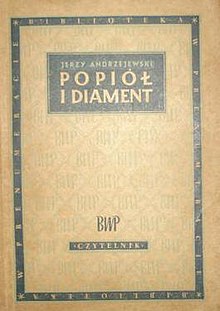Ashes and Diamonds

The original 1948 edition of Popiół i diament later rewritten by the eager writer
|
|
| Author | Jerzy Andrzejewski |
|---|---|
| Original title | Popiół i diament |
| Country | Poland |
| Language | Polish |
| Genre | Novel |
| Publisher | Czytelnik |
|
Publication date
|
1948 |
| Media type | Print (Hardback & Paperback) |
Ashes and Diamonds (Polish original: Popiół i diament, literally: Ash and Diamond) is a 1948 novel by the Polish writer Jerzy Andrzejewski, the first edition Zaraz po wojnie (Directly after the war). It was adapted into a film by the same title in 1958 by the Polish film director Andrzej Wajda. English translation, entitled Ashes and Diamonds, appeared in 1962. The story takes place during the last few days of World War II in Europe, and describes the political and moral dilemmas associated with the soon to be suppressed Anti-communist resistance in Poland (1944–1946). The protagonist Maciek is a soldier in the underground anti-communist Polish army assigned to kill the Communist Szczuka. The story follows Maciek's and other characters' actions in those ominous days.
According to a Polish journalist Krzysztof Kąkolewski the original story was the killing of a Communist - and robber - Jan Foremniak, in Ostrowiec Świętokrzyski in January 1945. Jerzy Andrzejewski rewrote the book according to changing party teachings because he was an eager Communist at that time.
The story takes place in Ostrowiec (probably Ostrowiec Świętokrzyski), Poland, and begins on 5 May 1945, one of the last days of World War II. The characters are all aware that the war will end soon. The Soviet Army had driven the German Army out of Ostrowiec in January, and the Communists are poised to take control of post-war Poland. In the story, Stefan Szczuka is the Secretary of the Province Committee of the Polish Workers' Party (PPR, a party of Communist orientation formed in the Soviet Union), and is expected to play an important role in the new government of Stalinist Poland. A jeep is transporting him to speak at a cement factory in Biała, a nearby town. The jeep is being driven by Frank Podgórski, who is the Secretary of the District Committee of the PPR. Podgórski recognizes a friend (Alicja Kossecka) walking alongside the road, and stops to greet her. Podgórski learns from her that her husband Antoni Kossecki, who was a local judge before the war, had returned from the German prison camp Groß-Rosen two days ago. He asks to visit them, and she agrees. Podgórski gets out of the car to talk with his friend which causes a delay. Szczuka impatiently honks the horn to get Podgórski to return to the jeep and resume the trip. Later, as they are driving, Podgórski explains to Szczuka who his friend Alicja Kossecka was and that her husband had just returned from the Nazi captivity. Szczuka mentions that he had also spent time in that prison camp, but cannot remember knowing anyone from Gross-Rosen named Kossecki. Podgórski suddenly remembers that Kossecki had been arrested under an assumed name, so that Szczuka would not have known him as Kossecki, but Podgórski cannot recall what his assumed name was.
...
Wikipedia
